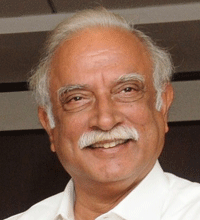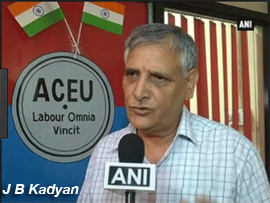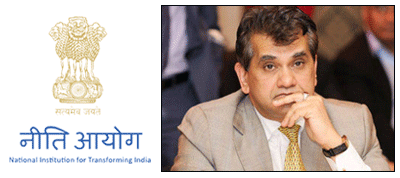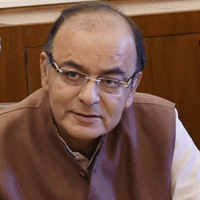Letter
To Minister
 A letter to the Civil Aviation Minister Ashok Gajapathi Raju (left)
dated June 14, 2017, from a forum of seven unions—AI Air Corporate
Employees’ Union, AI Employees’ Union, AI Aircraft Engineers’
Association, United Air India Officers’ Association, AI Engineers’
Association, AI Cabin Crew Association, and AI Service Engineers’
Association—predicts “massive protests” if the government
moves ahead with the NITI Aayog’s (the National Institution
for Transforming India, the premier policy ‘Think Tank’
of the government) suggestion to sell off the national carrier.
A letter to the Civil Aviation Minister Ashok Gajapathi Raju (left)
dated June 14, 2017, from a forum of seven unions—AI Air Corporate
Employees’ Union, AI Employees’ Union, AI Aircraft Engineers’
Association, United Air India Officers’ Association, AI Engineers’
Association, AI Cabin Crew Association, and AI Service Engineers’
Association—predicts “massive protests” if the government
moves ahead with the NITI Aayog’s (the National Institution
for Transforming India, the premier policy ‘Think Tank’
of the government) suggestion to sell off the national carrier.
It is no surprise the unions are worried
(to say the least) that there could be job losses if a private entity
buys the carrier.
The letter to the minister said:
“We urge you not to accept the
hurried recommendations by the Niti Aayog, and not to force the employees
of Air India to agitate which will lead to industrial unrest and disharmony.”
Losses
Trimmed PAX Business Up
Pointing out that
the government’s move would mean the death of the 64-year-old
national carrier, the letter went on to state that the sale had come
at a time when it was “showing all-round progress, profitability
and over 33 percent increase in the numbers of passengers.”
A few days ago, in fact, the airline
reported that it expected an operating profit close to Rs 300 crore
($45 mn) for FY17, up from Rs 105 crore ($16 mn) in 2015-16. Air India
has said that it increased core revenue, ancillary income, and operating
ratio in 2016-17 while trimming losses.
An Air India executive was quoted saying
the carrier had improved its load factor to 76.4 percent from 75 percent
last year. “This may seem marginal, but consider the huge capacity
deployment by private carriers on domestic routes,” he said.
Private
Sector Mouthpiece?
 Squarely blaming the Niti Aayog for being a “spokesperson of
the private sector,” the unions’ missive said that the
body was acting “unilaterally, arbitrarily, and illegally”
and had not sought the views of the stakeholders in the sale move.
Squarely blaming the Niti Aayog for being a “spokesperson of
the private sector,” the unions’ missive said that the
body was acting “unilaterally, arbitrarily, and illegally”
and had not sought the views of the stakeholders in the sale move.
J. B. Kadyan, Secretary General, ACEU
(Air Corporation Employees Union), speaking to a media outlet, said
that the unions would first approach the government to stop the sale
but “if they don’t listen to us, we will agitate.”
Kadyan also said that Niti Aayog CEO Amitabh Kant had not even evaluated
Air India’s assets before filing his report.
He also alleged that Kant had written
his report “sitting in a room” in 15 days. Kadyan also
emphasized: “We are not responsible for the mess of Air India,
government policies are.”
 Kant, (left)on his part, justified the move.
Kant, (left)on his part, justified the move.
He said: “We did a recommendation
on Air India in just 15 days’ time, it was very clear from its
analysis and statistics of its financial performance that it will
do better if you structure it with a private partner.”
The Niti Aayog CEO also said it was
the Aayog member’s belief that “government is very good
at some things and pathetic at other things.
“It should get out of areas where
it’s very bad and it should take out resources which are not
in productive area.
“There is no rationale of government
to put money into an airline which is just taking 14 percent of market
share.
“Private sector has done pretty
well and our analysis showed that the resources required are huge
and need to be put in education and health.”
The
Long & Winding Road
The Air India sale
story has seen many twists and turns. The carrier has received financial
infusions from the government and worked out plans for a turnaround,
but nothing has helped. However,
over the last fortnight, the government has adopted a fast-forward
mode with the Civil Aviation Ministry preparing a Cabinet note that
would decide the future action for the debt-ridden national carrier,
including possible privatization.
 In fact, Union Finance Minister Arun Jaitley stated that the government
was in favor of completely exiting Air India if a suitable investor
was available.
In fact, Union Finance Minister Arun Jaitley stated that the government
was in favor of completely exiting Air India if a suitable investor
was available.
He said that if 84 percent of the aviation
market could be run by private airlines there was “no reason
why it cannot go to 100 percent.”
Reports also confirmed that the government
decided for the sale of Air India in one go.
In a single stroke, the government
would cede control by reducing its stake to either below 49 percent,
or exit the national carrier completely.
A senior government official was quoted
saying that “no investor, domestic or foreign, will be interested
in buying a minority stake in Air India.
“There won’t be a 10, 15,
20 percent stake sale.
“It has to be privatization at
one go.
“The decision is whether the
government will bring down its ownership to below 49 percent or exit
altogether.”
Major
Write-off In The Wings
Meanwhile, the Cabinet
note mentioned that the government had decided to write off almost
half of the carrier’s estimated liabilities of Rs 60,000 crore
($9019 mn). “While the write-off is of the carrier’s liabilities
not backed by assets, the government might also incur an expenditure
for the settlement of the sovereign-backed part of AI’s aircraft
loan of about Rs 21,000 crore ($3156 mn),” the official pointed
out.
Let’s
Make A Deal
Apparently those who
lent to the carrier have reportedly had “informal talks with
the government” and expressed their willingness to negotiate
Air India’s loan settlement, including the re-setting of interest
rates. Incidentally, according to a rough estimate by the Civil Aviation
Ministry, the Maharaja’s assets—including its 115-strong
aircraft fleet, land parcels, buildings, flying/landing rights, and
parking slots at airports across the world—“are worth
around Rs 25,000-30,000 crore ($3758 mn - $4509 mn).”
Of
The Minority?
One of the major issues
the government will have to resolve is of holding a minority stake
in the carrier.
While the government has made it clear
it’s unlikely a foreign investor will be allowed to participate
in the privatization process, it cannot stop foreign airlines from
picking up stakes because the present Foreign Direct Investment (FDI)
rules allow foreign airlines to buy up to 49 percent stake in Indian
airlines.
Singh
A Song Of Air India?
 The rule—along with a recent interview with SpiceJet Chairman
Ajay Singh—has given rise to widespread belief that SpiceJet
could be one of the buyers of Air India if it is put up for sale.
The rule—along with a recent interview with SpiceJet Chairman
Ajay Singh—has given rise to widespread belief that SpiceJet
could be one of the buyers of Air India if it is put up for sale.
In an interview to the daily Times
of India at the end of May this year, in replying to whether
Air India would be a good buy for anyone if the government put it
on the block, Singh said that though AI had immense value, “it
has a massive mountain of debt.
“The debt,” Mr. Singh declared
“(almost Rs 50,000 crore or $7516 mn) makes it completely unviable.
“There is a massive working capital
debt, which is very difficult to repay.
“In its current form, it does
not appear to be a viable proposition.”
As to whether such a buy would be feasible
if the government took on a large part of the debt, the SpiceJet boss
said:
“That is hypothetical.
“One will have to look at what
is finally on offer.
“There is no doubt AI is a big
brand and has great assets as well.”
The unions’ threat to go on strike
could not have come at a worse time.
Countering a prolonged strike in Air
India is the last thing Air India management or the government want.
Today, the government finds itself
between a rock and a hard place as far as Air India is concerned.
Tirthankar Ghosh





